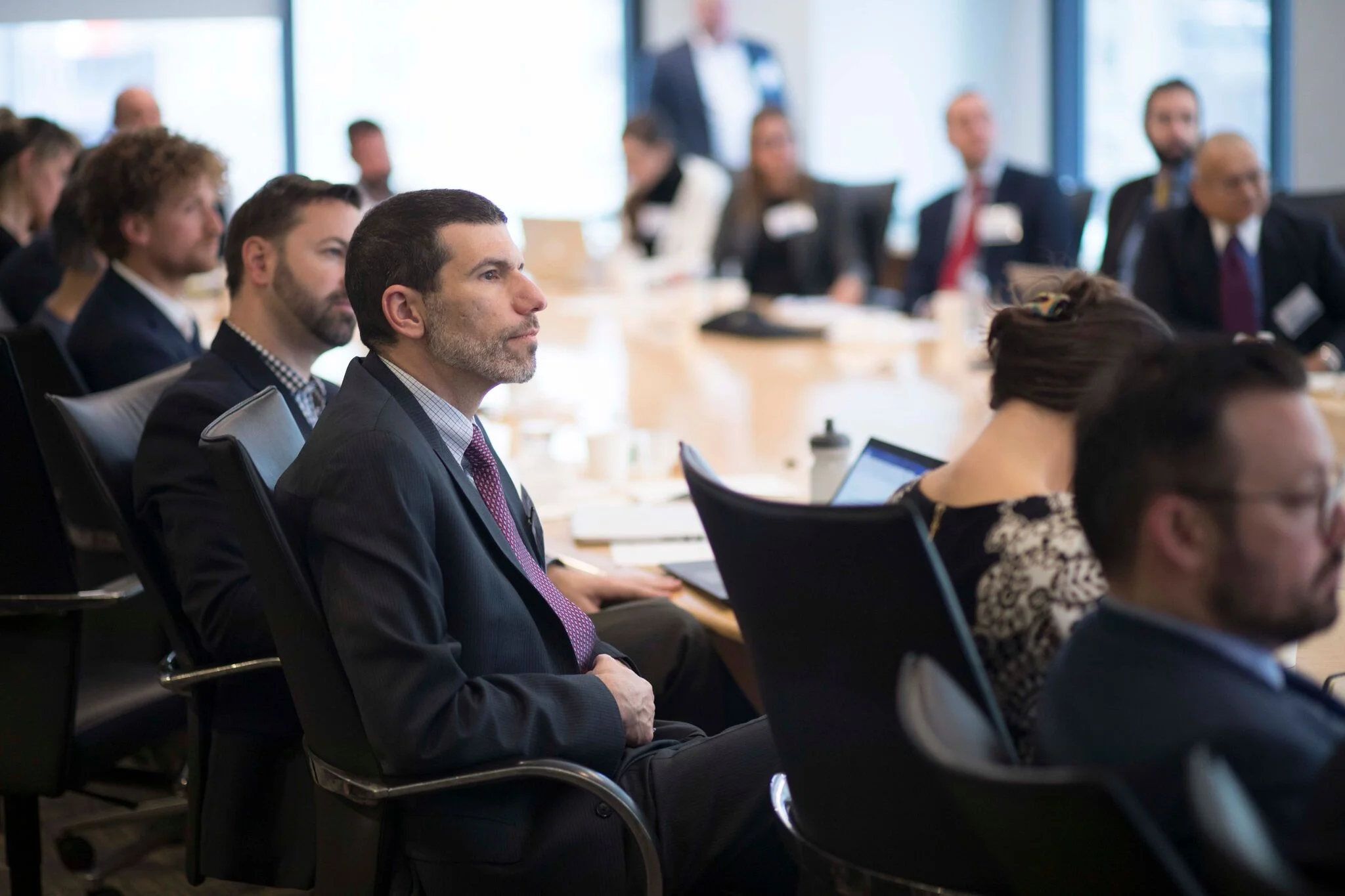- Jude Buenaseda, AEG Fellow
New York Advanced Energy Group’s Q4 2017 Stakeholder Breakfast on the topic of Mobility and Transportation, co-hosted by Duane Morris, highlighted challenges and success stories of the city’s transportation sector. Speakers at the forefront of mobility and transportation, including John Markowitz of New York Power Authority, Thomas Abdallah and Nora Ostrovskaya of MTA, Mark Simon of NYC DOT, Tim Kruekniet of EVBox, and Nick Hill of ReachNow car sharing by BMW, led the discussion on policies, goals, and new technologies for the city of New York. The stakeholder member discussion tapped into collective thought, solutions, and innovative ideas for a more effective and sustainable transportation sector for New York City.
The discussion leaders spoke on important developments and projects led by their respective organizations that aim to improve energy efficiency, sustainability, and resiliency in the city’s transportation system. From its subways and buses to the recent car sharing services, there are a multitude of public transportation services for the people of New York with reduced carbon emissions and improved convenience and are flexible to accommodate the evolution of its large population. Achieving the city’s carbon emissions reduction goals and replacing fossil fuel based energy sources with renewable energy has always been the focal point for these discussions and this one was no different.
Phyllis Kessler of Duane Morris opened the event with a brief overview of New York’s recent energy policies regarding Electric Vehicle (EV) tax credits and the EV tariff statute for utility companies. She highlighted the importance of EVs and their vital role as a pivotal factor in attaining these carbon reduction goals. Policy makers are developing new incentives to provide easier access to EVs that benefit the user, the energy grid, and the environment.
In support of electrification of vehicles, John Markowitz of the New York Power Authority (NYPA) explained in further detail how and why EVs are indeed much cleaner. Despite having fossil fuel based power plants as the electricity source for these vehicles, they still emit less carbon than Internal Combustion Engine (ICE) vehicles. Mr. Markowitz shed light on the new Bus Electric Pilot Program that NYPA is launching, with ten electric public buses and charging capabilities on the streets. NYPA also plans to place hundreds of charging stations across the city and plans to electrify JFK’s ground support vehicles.
Expanding the fleet of municipal EVs is part of a grander scheme for the electrification of New York. Mark Simon, from the NYC Department of Transportation (DOT), spoke on this expansion and its challenges. He elaborated on the city’s goals to increase EV registrations by 20% by 2025 as well as increasing access to new fast charging stations across all the boroughs. But these goals are met with persistent challenges, as the metropolitan is a challenging setting for a mass EV charging network.
The Metropolitan Transportation Authority (MTA)’s Thomas Abdallah and Nora Ostrovskaya then led the discussion. Thomas Abdallah from the MTA began his discussion with ‘Sustainable Mass Transit,’ as an infrastructure transition to renewable energy. He spoke about solar power installations at MTA stations in active and future projects, MTA’s green infrastructure initiative, and MTA’s solar facility. Nora Ostrovskaya addressed the financial challenges and lack of incentives to support these initiatives and new technology projects such as regenerative breaking, which harnesses the energy through the train car’s breaking system.
Nick Hill of ReachNow Car Sharing by BMW explained that car sharing is gaining more momentum across multiple regions. Like the Airbnb of vehicles, these types of disruption to the old fashion transportation services are prevalent due to its convenience. He emphasized that the car sharing industry could be a solution to the challenge of charging stations not being utilized to their full capacity. Many charging stations are found empty due to the lack of EV ownership but with the momentum of car sharing and electrification of their vehicles, they hope to fill up the charging stations in no time. To compliment car-sharing services, Tim Kreukniet of EVBox demonstrated EVBox’s charging product. EVBox is a universal charger and any type of EV will be able to charge it without complications. The product is already being used in the tens of thousands across various countries.
Finally, New York Advanced Energy’s Executive Director H.G. Chissell put the discussion into context by pressing on the critical issues that the stakeholders in the room had the expertise to address. In bringing together this diverse group of stakeholders, he provided a platform for turning these views and discussions into viable solutions for the city. While focusing on the issue of steps New York City needs to take to implement a carbon negative transportation system, the stakeholders came to a consensus that the city needs more investment, incentives, and a successful initiative program. The technology and thought leaders needed are already present, what is lacking is better execution and political will. In the end, it was apparent that all the stakeholders involved in New York City’s transportation sector are working towards building a more sustainable transportation system.
Advanced Energy Group is a stakeholder member-supported organization committed to developing and delivering advanced energy policies and solutions in key cities. Stakeholder sessions are by invitation only. For details of our programming please visit:
AEG Calendar of Events | AEG Podcasts | AEG Videos on Vimeo | AEG LinkedIn


